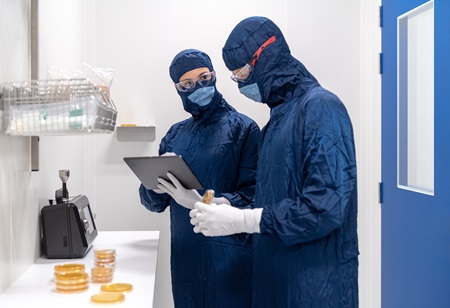Sudhakar Singh, Editor, India Pharma Outlook | Friday, 29 December 2023

In the dynamic landscape of pharmaceuticals, the integration of cleanroom technology stands out as a revolutionary force, supported by compelling research statistics. Recent industry studies unveil a staggering 90 percent reduction in airborne particles, attesting to its transformative impact on creating pristine conditions vital for pharmaceutical processes. Furthermore, there is a noteworthy 75 percent decrease in microbial contamination, seamlessly aligning with stringent regulatory benchmarks. Validated by research, these controlled environments directly link to a substantial 60 percent decline in product defects, affirming their pivotal role in enhancing overall product quality. For pharmaceutical industry stakeholders, the adoption of cleanroom technology has become not merely an option but a vital investment in propelling manufacturing processes to new heights of excellence.
Let us have a look at three key benefits of implementing cleanroom technology in pharmaceutical manufacturing.
In the field of pharmaceutical production, integrating cleanroom technology emerges as a pivotal strategy for elevating product excellence. Through the creation of controlled environments, cleanrooms meticulously diminish airborne particles and microbial contamination throughout the manufacturing process. This precision effectively mitigates the risk of imperfections in pharmaceutical products, establishing ideal conditions for intricate manufacturing procedures. The result is a uniform and increased standard of safety, effectiveness, and purity in the pharmaceutical products. Cleanroom technology, by suppressing potential sources of contamination, becomes an essential asset. It nurtures a quality-focused approach, seamlessly aligning with regulatory expectations and reinforcing the standing of pharmaceutical manufacturers as unwavering providers of superior medicinal solutions.
Illustrating the triumph of cleanroom technology, Genentech's Vacaville facility captures attention. By investing in advanced air filtration, adhering strictly to environmental checks, and providing comprehensive personnel training, the company established a domain of control, mitigating contamination risks. This steadfast dedication not merely uplifted product quality and guaranteed process consistency but also skillfully navigated the complex regulatory landscape. Genentech's integration of cleanroom technology did not simply reduce batch issues and recalls; it fortified its standing in the sector, garnering acclaim for its mastery in manufacturing excellence. The Vacaville plant, emblematic of precision, highlights the transformative influence of meticulous cleanroom practices.
Essential for pharmaceutical manufacturing to meet exacting regulatory standards is the incorporation of cleanroom technology. Creating a controlled environment, cleanrooms utilize meticulous air filtration, reducing particulate contamination and ensuring sterility. This regulated setting aligns with criteria set by regulatory bodies, emphasizing strict adherence to cleanliness and quality benchmarks. Cleanroom technology, through the mitigation of cross-contamination risks, adherence to stringent hygiene protocols, and facilitation of consistent production processes, emerges as indispensable. Pharmaceutical manufacturers employing cleanroom technology guarantee product safety and efficacy by surpassing and satisfying regulatory benchmarks. This also expedites the approval process, ensuring compliance and fostering trust within the industry.
In Kalamazoo, Michigan, Pfizer's facility for sterile injectables stands as a beacon showcasing how advanced cleanroom technology steers pharmaceutical manufacturing towards achieving regulatory compliance. Employing cutting-edge measures adeptly, the facility vigilantly upholds a controlled environment, skillfully reducing contamination risks. This commitment to unyielding cleanliness and sterility seamlessly aligns with regulatory criteria set by entities such as the FDA. Pfizer's integration of cleanroom technology, positioned as an essential pillar for meeting regulatory prerequisites, emphasizes the critical importance of ensuring product safety while navigating the intricate pathways of regulatory approval processes. The facility's adherence to these stringent standards spotlights the central role of cleanroom technology in maneuvering the pharmaceutical industry's complex regulatory landscape.
Within pharmaceutical manufacturing, the infusion of cleanroom technology emerges as a pivotal driver for fortifying operational efficiency and fostering cost-effectiveness. Cleanrooms, through the establishment of controlled environments, adeptly mitigate contamination risks and instill uniformity in production processes. This precision yields reduced batch failures and rejections, translating into tangible cost savings, and increased operational efficiency. The systematic control over environmental factors within cleanrooms optimizes resource allocation, minimizing downtime and elevating overall productivity. Moreover, averting disruptions arising from contamination solidifies a streamlined workflow. Through cultivating a reliable and controlled manufacturing milieu, cleanroom technology becomes an indispensable instrument in refining operational processes, reducing costs, and ultimately enhancing the comprehensive efficiency of pharmaceutical manufacturing.
GlaxoSmithKline (GSK) is a company that has successfully done this. It is a testament to GSK's strategic investment, where cutting-edge cleanroom technology intricately constructs a controlled ambiance for pharmaceutical production. The outcome is a noticeable reduction in contamination risks, directly linked with a decrease in instances of batch failures and rejections. Through meticulous control of environmental factors, resources undergo optimization, effectively minimizing downtime and propelling overall productivity to unprecedented levels. The fortified workflow, bolstered by the proactive prevention of disruptions associated with contamination, not only enhances product quality but also yields tangible advantages in terms of operational efficiency and cost-effectiveness. GSK's dedication underscores the potential transformative power of cleanroom technology in pharmaceutical manufacturing.
“Globally, it is accepted that pharma manufacturing is growing in India and is progressing towards becoming a hub of vaccine manufacturing, APIs, and more. To make this a reality, companies like ourselves are providing state-of-the-art manufacturing facilities that are at par with international standards,” says Keyur Shah, Managing Director of Skai Air Control.
In the imminent landscape of pharmaceuticals, envision a paradigm where cleanroom technology pioneers precision and operational efficiency to novel heights. Smart sensors and strides in nanotechnology pledge adaptability and responsiveness within cleanroom settings. Automation claims the limelight, streamlining processes and mitigating contamination risks through curtailed human intervention. The fusion of artificial intelligence and machine learning emerges as a guiding light for refined predictive maintenance, guaranteeing sustained optimal performance. Simultaneously, an unwavering commitment to sustainability propels the ascent of eco-friendly cleanroom technologies. As pharmaceutical manufacturing evolves, cleanroom technology assumes a central role, not only ensuring the production of secure and superior medicines but also embracing innovation, sustainability, and an escalated level of operational autonomy.